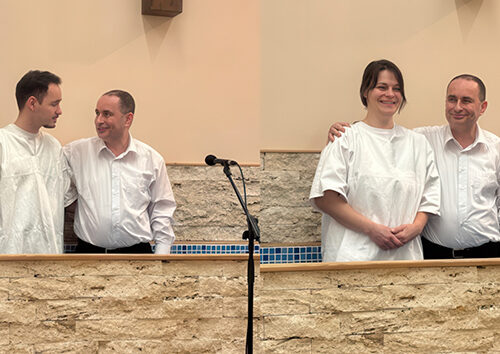12 August 2024 | St Albans, UK [Mark Finley with tedNEWS]
“Our speech reveals our character,” says Mark Finley. As online dialogue and public discourse become increasingly uncivil, how should end-time people conduct themselves? In a presentation for young professionals delivered on 3 August at the Adventist Laymen’s Services and Industries (ASI) 2024 International Convention in Orlando, Florida, Finley explored five transformative principles for effective, Christ-centered communication. This article is published in a manner that preserves the speaker’s original presentation style.
As a child, did you ever hear the saying, “Sticks and stones will break my bones, but words will never hurt me.” Your mother may have said it, but it is simply not true. Our words have a powerful effect on others.
- Encouraging words bring joy to discouraged, downtrodden spirits.
- Fault finding, stinging words crush the spirits.
- Hopeful words bring joy to our hearts.
- Critical words pierce our hearts like swords.
- Positive, uplifting words lift each one of us from the darkness of despair to the light of Christ’s joy.
- Negative, condemnatory worlds lead us to feel unaccepted and unappreciated.
I want to share with you five eternal truths about the words we speak in the light of the judgement and the soon return of our Lord.
Speaking of the 144,000, Revelation 14:1-5 says of the people who are alive when Jesus comes and are translated without seeing death, “These are they that follow the Lamb wherever He goes. These were redeemed from among men, being the first fruits unto God and the Lamb. And in their mouth was found no guile: for they are without fault before the throne of God.”
Notice the emphasis on speech: “In their mouth was no guile, no hypocrisy, no deceit.” Their words were positive, uplifting, and encouraging, with integrity and no dishonesty.
Ellen White, in Christ’s Object Lessons, says:
“The power of speech is a talent that should be diligently cultivated. Of all the gifts we have received from God, none is capable of being a greater blessing than this. With the voice we convince and persuade, with it we offer prayer and praise to God, and with it, we tell others of the Redeemer’s love. How important, then, that it be so trained as to be most effective for good.” (Christ’s Object Lessons p. 336)
Principle 1.
Our speech is one of the greatest gifts God has given to us. Our words reflect upon us in remarkable ways and influence others beyond what we might even imagine. Jesus’ words provide an example for all of our speech.
“So, all bore witness to Him and marvelled at the gracious words that proceeded out of His mouth.” (Luke 4:16-22).
Gracious words—from the Greek word “charis”—are the only time in the Bible used to modify words. It comes from the word ‘grace’. What is grace? Gracious words are courteous, kind, and pleasant. They are not rough, crude, and thoughtless.

Let me give you two examples of this in the life of Jesus.
a) The Canaanite woman (Matthew 15:21-28)
Who were the Canaanites? The Canaanites were a heathen tribe who believed in multiple gods and goddesses. They practised fertility rites and offered human sacrifices to their gods. Cultic prostitution was also practised to encourage their gods. They were a violent, barbaric people. Jesus sees faith in an unlikely place and speaks words to encourage that faith: “O Woman, Great is your faith.”
b) The Roman Centurion (Matthew 8:5-10)
A Roman centurion commanded at least 100 soldiers. They could be appointed by the Roman senate or come up through the ranks of the Roman army. They were especially known for their courage and bravery. Historians cite examples of them being first over an enemy’s castle wall or the first through a break in the enemy’s defences. They were men hardened in battle and unlikely to respond to the Gospel. They knew the horrors of war and the brutality of battle. But this man’s servant was dying, and he was desperate. But the Holy Spirit had been working on his mind.
We cannot always see the working of the Spirit. Jesus’ words and actions were specifically designed to build this man’s faith so he would become a believer. Jesus marvelled and said, “I have not found such great faith even in Israel” (Matthew 5: 10). Jesus then healed this man’s servant.
“You may think that what you do or say is of little consequence, when the most important results for good or evil are the consequence of our words and actions. The words and actions looked upon as so small and unimportant are links in the long chain of human events” (3 Testimonies p. 542).

Principle 2.
Positive words spoken to others bring health to the body, mind, and spirit and also strengthen our immune systems.
“Pleasant words are like a honeycomb, sweetness to the soul and health to the bones.” (Proverbs 16:24)
In their book, ‘Words Can Change Your Brain’, Dr Andrew Newberg, a neuroscientist at Thomas Jefferson University, and Mark Robert Waldman, a communication expert state, “A single word has the power to influence the expression of genes that regulate physical and emotional Furthermore, according to these two experts in their field, exercising positive thoughts can quite literally change one’s reality.”
They continue, “By holding a positive and optimistic [word] in your mind, you stimulate frontal lobe activity. This area includes specific language centres that connect directly to the motor cortex responsible for moving you into action. And as our research has shown, the longer you concentrate on positive words, the more you begin to affect other areas of the brain.”¹
Over time, given sustained positive thought, functions in the parietal lobe start to change. Consequently, this changes our perception of self and those around us. Essentially, holding a positive view of ourselves helps train our brain to see the good in others.
Thus, by exercising consistent positive thoughts and speech, we change not only our self-perception but also how we perceive the world around us. Ultimately, this allows us to shape our reality and change the world for the better.”
In their neuroscience experiment, “Do Words Hurt?”, Maria Richter and collaborating scientists monitored subjects’ brain responses to auditory and imagined negative words. During this process, they discovered that painful or negative words increase Implicit Processing (IMP) within the subgenual anterior cingulate cortex (SACC). Put frankly, their study proved that negative words release stress and anxiety-inducing hormones in subjects.²

Additionally, a study found increased levels of anxiety in children associated with higher rates of negative self-talk. According to the study’s abstract, “These results suggest negative self-talk plays a role in the generation of maintenance of anxiety in normal children. “Ultimately, negative words, whether spoken, heard, or thought, not only cause situational stress but also contribute to long-term anxiety.
Principle 3.
Negative words spoken to others break down the immune system, impact total health, and separate the best of friends.
“An ungodly man digs up evil and it is on his lips like a burning fire. A perverse man sows strife and a whisperer separates the best of friends.” (Proverbs 16:27,28)
“Unchristlike speech lies at the foundation of nine-tenths of all difficulties that exist in the church. Satan’s agents are industriously trying to get professed Christians to speak unadvisedly. When they succeed, Satan exults because God’s followers have hurt their influence.” (Review and Herald, November 24, 1904)
What we speak about others says more about ourselves than it does about those we speak about. “For out of the abundance of the heart the mouth speaks.” (Matthew 12:33-37)

There are three reasons we tend to be critical of others:
a). We do not understand the depth of God’s grace. When we understand the majesty of His love, the magnitude of His forgiveness and the greatness of His love toward us, we will tend to be far more charitable toward others. We have received grace, so we can be gracious.
b). We do not understand the nature of our hearts. We are insecure in our relationship with Jesus and with others. Therefore, sometimes, when we criticise others, we feel better than them. This unholy piety, this pharisaism disguised as righteousness, in some strange way, fuels our pride and makes us feel superior.
c). We do not understand the challenges others are going through. We make judgements without really knowing the facts. We have a superficial knowledge of the situation and criticise what we do not know.
Joseph Ola, a former Nigerian Union president, once shared an African proverb with me. “The chicken passed by, and we did not see him because of his feathers.”

Early one Monday morning, a man sat on a commuter train in New York City with his head in his hands. His three kids played loudly down the aisle of the train, disturbing other passengers. After a while, one lady spoke up. “Mister, can’t you control your kids? They are disturbing everybody on this train, and all we want is a quiet moment to relax before work.
The man responded quietly so his children could not hear. “I am sorry – you see, we have just come from the hospital, and my wife died last evening after a long fight with cancer.” I haven’t told the children yet. Sorry, we disturbed you.”
Knowing this gentleman’s story made all the difference to this woman on the train. Listening carefully before we speak, understanding what others are experiencing, comprehending what they are going through, and shaping our own words to meet their needs makes all the difference. Sometimes, listening is as important as speaking.
Proverbs 18:13 in the English Revised Version speaks to this point clearly.³
“Let people finish speaking before you try to answer them. That way, you will not embarrass yourself and look foolish.”
Now, there is something we do not want to listen to. That is criticism of another person.
If we listen to criticism about a brother or sister in Christ and fail to speak up in their defence, we are as guilty before God as if we had spoken the words ourselves.

Revelation 12:11 calls Satan the “accuser of the brethren. ” If we listen to such talk we become ‘Satan’s sympathisers’. I don’t want to be one of Satan’s sympathisers, and I am sure you do not want to be one either.
If we speak evil or negatively of others, we develop those traits in our own lives.
“Cultivate the habit of speaking well of others. Dwell upon the good qualities of those with whom you associate, and see as little as possible of their errors and failings. When tempted to complain about what someone has said or done, praise something in that person’s life or character… Earnest workers have no time for dwelling upon the faults of others. We cannot afford to live on the husks of other’s faults or failings.
Evil speaking is a twofold curse, falling more heavily upon the speaker than upon the hearer. He who scatters the seeds of dissension and strife reaps in his own soul the deadly fruits. The very act of looking for evil in others develops evil in those who look. By dwelling upon the faults of others, we are changed into the same image. But by beholding Jesus, talking of his love and perfection of character, we become changed into His image” (Gospel Workers p. 479).
Principle 4.
Encouraging, hopeful words can make an eternal difference in someone’s life. They may even save their life.
During an evangelism series held in Kingston, Jamaica, the daughter of a church elder made a phone call to our call centre with a threat to commit suicide. The call was handed to me. “I have no reason to live”, she said, “and I have given up on life. You are the last person I will speak to.” “Why is that”? I asked. “Because I have failed”, replied the woman, “There is no hope. I am so broken, and I feel so guilty and bruised, and I have the pills in my hand. Would you tell my father that I am sorry?” I encouraged her, told her to call a friend and let her know that I would call her again. Later, I explained that I would be speaking to the students at the university. My chosen topic was, “The Best is Yet to Come”, during which I shared the words of two texts: Jeremiah 29:11, “For I know the thoughts that I think toward you, says the Lord, thoughts of peace and not of evil, to give you a future and a hope.” And then I shared words from Jeremiah 31:3, “I have loved you with an everlasting love; Therefore with lovingkindness I have drawn you.”
Leaving, she broke through the crowd, took my hand, and said, “Pastor, I am going to be okay.” My words had made a difference!

Principle 5.
The Christ who spoke positive, uplifting words encouraging those around Him will enable us to speak hopeful words to those around us.
“The Lord God has given me the tongue of the learned that I may know how to speak a word in season to him who is weary.” (Isaiah 50:4)
As I read this text I am prompted to ask five questions.
- Who gives us the tongue to speak helpful, hopeful, healing words? The Lord God.
- What does God reveal? He impresses us with what words to say, how to say it, and when to say it.
- Can you say the right thing in the wrong way at the wrong time? Yes.
- Can you say the wrong thing in the right way at the right time? Yes.
- Can you say the right thing in the right way at the wrong time? Yes
Our prayer each morning ought to be God help me speak encouraging, hopeful, words in the right way at the right time.
Colossians 4:6 says, “Let your speech be always with grace seasoned with salt that you may know how to answer each one.”
“Wherever we are, we should watch for opportunities to speak to others of the Saviour. If we follow Christ’s example in doing good, hearts will open to us as they did to Him. Not abruptly, but with tact born of divine love, we can tell them on Him who is the ‘Chiefest among ten thousand” and the One “altogether lovely.” (Song of Solomon 5:10, 16) This is the very highest work in which we can employ the talent of speech. It was given to us that we might present Christ as the sin-pardoning Saviour.” (Christ’s Object Lessons p.340)
There is no greater privilege, deeper joy, or higher honour than using the gift of speech to share Jesus’ love, the truth of His Word, and His last-day message with those around us.
May we be sensitive to the opportunities he gives us, and responsive to the doors he providentially opens. May we be alert to the possibilities before us to speak a word at the right time to some seeking soul, longing for words of hope and encouragement—that is my prayer.
[Photos: featured, Enno Mueller, Adventist Media Exchange (CC BY 4.0). All other images: Dreamstime].
¹ Newberg, Andrew, and Mark Robert Waldman. Words Can Change Your Brain: 12 Conversation Strategies to Build Trust, Resolve Conflict, and Increase Intimacy. Hudson Street Press, 2012.
² Richter, Maria. “Do Words Hurt?” NeuroImage, vol. 49, no. 3, 2010, pp. 2009-2013. doi:10.1016/j.neuroimage.2009.09.045.
³ The Holy Bible: English Revised Version. Cambridge: Cambridge University Press, 1885.
All other Bible texts from, The Holy Bible: New King James Version. Thomas Nelson, 1982.



